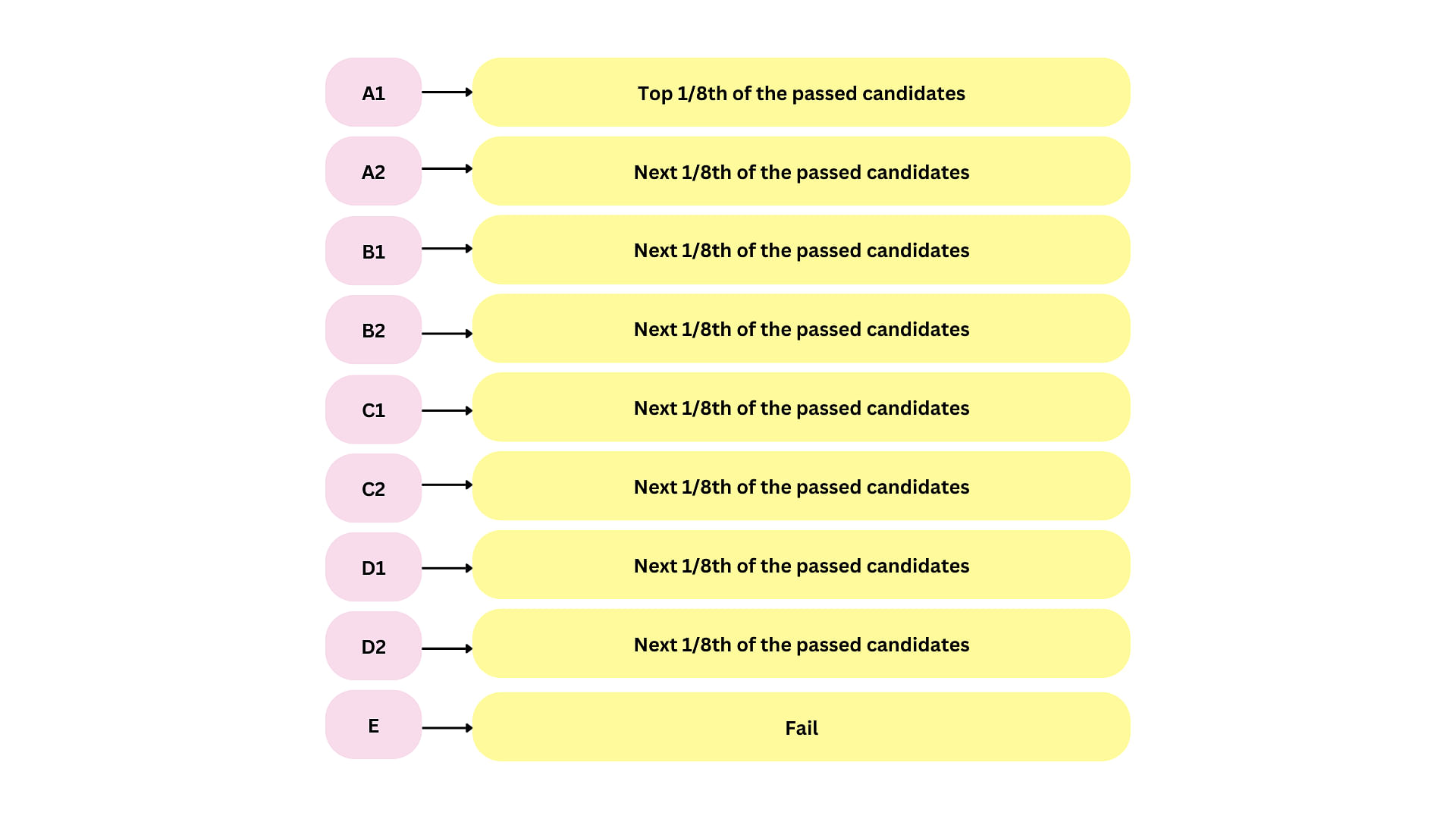CBSE Class Exam Pattern for Class 10 and 12 has detailed information on assessments, grading system, marking schemes, and attendance rules for classes 10th and 12th.
Table of Contents
According to the revised CBSE exam pattern 2024 for Class 10 & 12, the theoretical paper is worth 80 marks, while the internal evaluation is worth 20 marks. CBSE has scrapped the two-term exam model for the CBSE 12 exam for the academic year 2024. Students will now appear for a 3-hour final exam.
The board has opted to emphasize Competency-Based Education (CBE). Therefore, knowing the CBSE exam pattern 2024 would be extremely beneficial to students, as it will enable them to design an effective approach for the CBSE examination 2024.
CBSE New Exam Pattern 2024
The new CBSE exam pattern will help assess students' understanding, reading, interpretation, and writing ability and avoid rote learning. In addition, it is said that the board had decided to add more case-study-based questions where students are supposed to go through a paragraph and answer questions accordingly.
Before we go into the intricacies of CBSE's new Test Pattern, let's take a look at the modifications that have been made to the CBSE exam pattern:
- All subjects have an internal examination.
- In the question paper, there is an internal choice. All subjects have questions added to them.
- Mathematics at the second level is only for grades 10th and up to students.
- There have been significant modifications in the total number of questions across all disciplines.
Also Read: CBSE Class 10th Blueprint 2024
CBSE Class 12th Exam Pattern 2024
The overall marks and duration of the test will remain the same, the question paper will comprise a greater proportion of competency-based questions or questions that assess the application of suggestions in real-life/ modern ways. The CBSE exam pattern is as follows:
Competency-Based Questions
Competency-based questions would be a minimum of 30%. These can be in the form of Multiple Choice Questions, Case based Questions, Source-based Integrated Questions, or any other types
Short / Long Questions
50% short answer/long answer questions (as per the existing pattern).
Objective Type Questions
Students can easily score high marks with the addition of 20% objective type questions (Objective type, Fill in the Blank spaces, Assertion-Reason) in all subjects. This will enhance their exam scores and alleviate writing a long and complex paper.
Internal Evaluation
Internal Assessment will be given a 20% weightage in all subjects under the new exam pattern. The internal evaluation procedure is as follows:
- Multiple Assessment – 5 marks
- Periodic test – 5 marks
- Subject Enhancement Activities – 5 marks
- Portfolio – 5 marks
Also Read: CBSE Class 12th Blueprint 2024
CBSE Class 12th Passing Criteria 2024
A candidate needs to obtain a minimum of 33% in theory and 33% in practical/internal examination to pass CBSE class 12th exam as per the new CBSE exam pattern. A candidate must also achieve 33% marks in aggregate in all the subjects. Below are the detailed passing criteria for CBSE 12th board exams:
- A candidate receives a pass certificate if they acquire a grade higher than an 'E' in all internal assessment subjects.
- A candidate shall obtain at least 33% marks in all five external examination subjects (main/compartmental).
- For subjects involving practical work, a candidate must obtain 33% marks in theory and 33% marks in practicals separately to qualify.
- Candidates exempt from one or more internal examinations will be eligible to appear in the external exams.
- However, the result shall be declared only after the fulfillment of other conditions.
Also Read: CBSE 12th Sample Papers
CBSE Class 12th Grading System 2024
Every year, around ten lakh students apply to take the CBSE exam. Most class 12th students are confused by CBSE's grading system, which is identical to class 10th. The board will rate all students and issue grades in the following order:

Also Read: CBSE 12th Preparation Tips
CBSE Class 10th Exam Pattern 2024
The new CBSE exam pattern for class 10th has been released. The CBSE exam pattern for all subjects, including Math, Science, English, Social Science, and more, are explained below:
- All subjects will have more objective-type questions.
- The internal choice will be more problematic in the paper.
| Subjects | Total 100 Marks (Class X- Syllabus only) | |||
| 80 Marks (Theory Board Examination) Passing marks- 33% out of 80 in each subject | 20 Marks (Internal Assessment) Passing marks- 33% out of 20 in each subject | |||
| Periodic Test (10 Marks) | Notebook Submission (5 Marks) | Subject Enrichment Activity (5 Marks) | ||
| Language 1 | Board exams would be of 80 marks for each subject which would cover 100% of class X syllabus only. Both Marks and Grades will be awarded for individual subjects.9 point grading system would be followed. | Periodic written tests are restricted to three in each subject in an academic year. Average of the best two to be taken for final submission. | This Includes: Regularity
|
Speaking and Listening Skills |
| Language 2 | Speaking and Listening Skills | |||
| Science | Practical Lab work | |||
| Mathematics | Maths Lab Work | |||
| Social Science | Map work and Project Work | |||
| 6th Additional Subject | If a student opts for language as an additional subject, modalities defined for languages one and two shall be followed | |||
Also Read: CBSE 10th Date Sheet 2024
CBSE Class 10th Passing Criteria 2024
All board exam papers (including the additional topics) will be worth 80 points; a student must receive at least 33 percent to pass.
When a Student Fails
-
Suppose a student fails one of the three compulsory academic subjects (Science, Mathematics, or Social Science) but passes the Skill subject (offered as the sixth optional subject).
-
In that case, the academic subject will be replaced by the Skill subject, and the class 10th board examination result will be computed accordingly.
-
Suppose a student fails any of the first five main subjects. In that case, that subject will be replaced by the language taken as a sixth subject (in the absence of skills subjects) or as a seventh subject (optional), provided that they have passed that language subject and that either Hindi or English remains as a passed language in the first five subjects after replacement.
Internal Choice in Question Paper
CBSE officials have implemented internal choice in question papers. Students will find 33 percent internal choice in all sections of the question paper for all subjects. As a result, students will have a variety of options from which to choose. This will assist them in answering questions about which they are more knowledgeable.
Objective Type Questions
Officials have implemented 20% objective-type questions in all subjects as per the CBSE exam pattern. Objective-type questions will receive 20 marks out of a possible 80. (Multiple Choice Questions, Fill in the Blanks, etc.). Subjective questions requiring students to write a detailed response will be worth only 60 marks.
Also Read: CBSE 10th Syllabus 2024
CBSE Class 10th Marking Scheme and Grading Pattern 2024
Around 20 lakh students appear for the CBSE 10th exam. Therefore, it is necessary to know the marking scheme and grading pattern of CBSE class 10th.
i) Periodic Test (05 Marks): A total of 3 periodic tests will be conducted for each subject. Out of which, an average of two will be taken for final submission. The weightage of this will be five marks.
ii) Multiple Assessment (05 Marks): Schools have the authority to use other assessment modes depending on the subject's demand. This can include oral tests, individual or group work, class discussions, fieldwork, concept maps, graphic organizers, visual representation, etc. The weightage of this will be five marks.
Portfolio
A portfolio is a collection of a student's work that describes the student's efforts, progress, growth, and accomplishments in several areas of study. The following are the elements that can be used to evaluate a portfolio. The work's representation is as follows:
-
This encompasses neatness as well as aesthetic appeal.
-
Completion of guided work aimed toward achieving particular curriculum goals
-
The development of students
-
All relevant work is included (completeness)
-
This will have a weighted average of 5 points.
Subject Enrichment Activities
This is worth another 5 points and evaluates a student's practical, project work, and language capabilities. The subject enrichment activity varies depending on the subject. For example, hearing, speaking, and vocabulary abilities will be evaluated in the language subject, whereas practical work will be reviewed in math and science. In addition, some relevant project work will be reviewed for a subject like social science.
Also Read: CBSE 10th Sample Papers
CBSE Attendance Rules for Class 10th and 12th 2024
The Central Board of Secondary Education (CBSE) has chosen to keep track of its associated schools' students' attendance. It has given schools new instructions, requiring them to provide their students' attendance reports.
In addition, the board will decide whether or not to allow students to appear for the examinations for which it is responsible based on attendance. After a recent study, the board decided that students with low attendance scored poorly in exams. The CBSE has also devised Standard Operating Procedures (SOPs) to deal with low-attendance incidents:
- The board has framed new rules on low attendance.
- Students will be exempt if a protracted loss of a mother or father, illness, engagement in sports, or other comparable circumstances.
- By the first day of the academic year, schools should have completed their attendance records and reported them to CBSE.
All the changes in the CBSE board exam patterns have been made to reduce the strain on students and their mental health in these times of distress amid the surging Covid. However, the Central Board of Secondary Education will be altering more elements in the future to further reduce unrest among students and schools.
Also Read: CBSE Additional Practice Paper



POST YOUR COMMENT